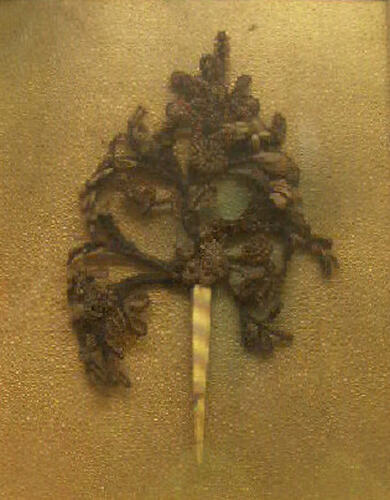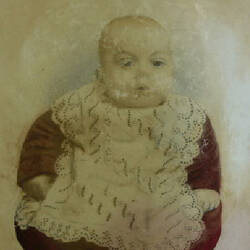Summary
Tiny collection of hair formed into a flower posy and mounted in a frame with image of deceased child Percy Gay McDougall, who died in 1886. Hair was often preserved decoratively to remember a loved one who had died.
Percy was born in Melbourne and lived only 10 months, dying of gastroenteritis and asthma. His father, John Johnston McDougall, was an 'engine man', born in Scotland. His mother, Maria Gay, was born in Melbourne in 1851. They were married in 1879, the year their first baby Marian was born. They had a total of seven children, all of the rest of whom lived until adulthood. Marian died at the age of 20. Maria herself died in 1939, at the age of 89, having outlived at least four of her children. The photo was donated to the National Trust in October 1975 by Dorothy Lennox, last daughter of Maria and John, and sister of baby Percy.
The memento was framed by A. Matrhoffer & Co., who opened a business known as 'The Modern Picure Gallery and Picture Works', including a picture framing service, at No.145 Barrack Street, Perth in May 1898. By 1905, the business had moved to 445 Hay Street, Perth, with a branch at Fremantle.
The ornament was donated to the National Trust in October 1975 by Dorothy Lennox, last daughter of Maria and John, and sister of baby Percy.
Physical Description
Tiny collection of hair, formed into a flower posy with a gold handle. Mounted in a brown wood frame with a gold-coloured mount. Hand-tinted photographic image printed on opaque white glass.
Significance
Mourning objects provide an important insight into the ways people coped with the daily reality of mortality in 19th century Victorian society. Tangible reminders kept the memories of loved ones close, and many included personal items such as hair or photographs.
It is thought that about one in five children in Melbourne in the 1850s died in infancy. Poor sanitation, often inadequate diet, and lack of knowledge about the causes and treatment of disease kept mortality high. By the later 19th century sanitation and medical knowledge had improved, but the loss of young babies and children was still an ever-present danger.
Research note: a preliminary search in the Sands & McDougall Post Office Directories for Melbourne did not find a 'Mayrhoffer' resident in the city in 1870, 1880, 1900 or 1910. A search for 'Mayrhoffer' through Picture Australia and Collections Australia Network was similarly unsuccessful, as was a search of British collections including the British Library, Mary Evans Picture Library, National Museums Scotland, and a search of Getty Pictures and the National Library of New Zealand.
More Information
-
Collecting Areas
-
Acquisition Information
Transfer from National Trust of Australia (Victoria), 2008
-
Person Commemorated
-
Framer
A. Mayrhoffer & Co., The Picture Arcade & Picture Framing Works, 445 Hay Street, Perth, Greater Perth, Western Australia, Australia, circa 1905
-
Inscriptions
Inscription: Paper label on reverse (poor condition and only partly legible), with printed words including 'THE / PICTURE ARCADE / AND / Picture Framing Works / A. MAYRHOFFER & CO./.The word 'High' appears to be part of an address.
-
Classification
-
Category
-
Discipline
-
Type of item
-
Overall Dimensions
279 mm (Width), 34 mm (Depth), 328 mm (Height)
-
References
The West Australian, 9 May 1898, p.1, Advertisement, [Link 1] accesed 08/05/2011. Wise's Western Australia Post Office Directory for 1905, p.830. Wise's Western Australia Post Office Directory for 1907, p.920.
-
Keywords

